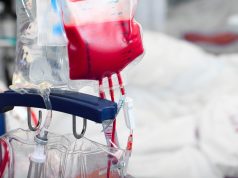This could explain gender gap in survival, researchers say
TUESDAY, Nov. 10, 2015 (HealthDay News) — Women are less likely than men to get the recommended treatments for myocardial infarction (MI) survivors, and that could explain much of the gender gap in long-term survival, according to research scheduled for presentation at the annual meeting of the American Heart Association, held from Nov. 7 to 11 in Orlando, Fla.
The findings are based on Medicare records from 49,358 Americans who were hospitalized for MI at one of 366 U.S. hospitals between 2003 and 2009. Optimal care was defined as patients sent home with prescriptions for all of the standard therapies that are appropriate for them, including counseling on smoking cessation; referral to a cardiac rehab program; and prescriptions for a low-dose daily aspirin, a statin, or blood pressure drugs such as beta blockers and angiotensin-converting enzyme inhibitors.
Overall, 16,130 people died within three years of their hospital discharge, with the risk higher among women whose care was suboptimal. The researchers found that women were 8 percent less likely to be on optimal care when discharged.
Deepak Bhatt, M.D., M.P.H., director of interventional cardiovascular programs at Brigham and Women’s Hospital in Boston, and coauthor of the new study, told HealthDay that what is key in this research is that suboptimal care accounted for the gender gap in MI patients’ long-term survival. When women received optimal treatment, they were just as likely as men to be alive three years later. “I think you can look at this as ‘good news,'” Bhatt said, “because that is an actionable finding. If we just give women these simple, guideline-recommended therapies, we can close the mortality gap.”
Copyright © 2015 HealthDay. All rights reserved.








